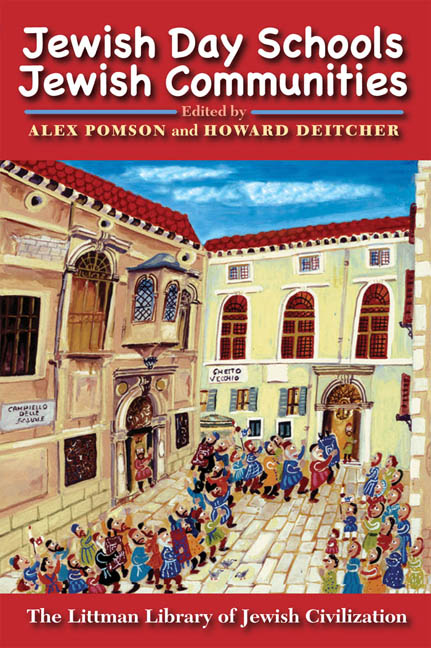Book contents
- Frontmatter
- Dedication
- Acknowledgements
- Contents
- Note on Transliteration
- Introduction: Jewish Schools, Jewish Communities: A Reconsideration
- PART I Insights from Public and General Education
- PART II Cross-Cultural Insights
- 6 Do Jewish Schools Make a Difference in the Former Soviet Union?
- 7 Jewish Pupils’ Perspectives on Religious Education and the Expectations of a Religious Community: The Jewish High School in Berlin
- 8 Mutual Relations between Sheliḥim and Local Teachers at Jewish Schools in the Former Soviet Union
- 9 Community School versus School as Community: The Case of Bet El Community in Buenos Aires
- 10 Beyond the Community: Jewish Day School Education in Britain
- 11 Attitudes, Behaviours, Values, and School Choice: A Comparison of French Jewish Families
- 12 The School Ghetto in France
- PART III Insights through the Prism of Community
- Contributors
- Index
9 - Community School versus School as Community: The Case of Bet El Community in Buenos Aires
from PART II - Cross-Cultural Insights
- Frontmatter
- Dedication
- Acknowledgements
- Contents
- Note on Transliteration
- Introduction: Jewish Schools, Jewish Communities: A Reconsideration
- PART I Insights from Public and General Education
- PART II Cross-Cultural Insights
- 6 Do Jewish Schools Make a Difference in the Former Soviet Union?
- 7 Jewish Pupils’ Perspectives on Religious Education and the Expectations of a Religious Community: The Jewish High School in Berlin
- 8 Mutual Relations between Sheliḥim and Local Teachers at Jewish Schools in the Former Soviet Union
- 9 Community School versus School as Community: The Case of Bet El Community in Buenos Aires
- 10 Beyond the Community: Jewish Day School Education in Britain
- 11 Attitudes, Behaviours, Values, and School Choice: A Comparison of French Jewish Families
- 12 The School Ghetto in France
- PART III Insights through the Prism of Community
- Contributors
- Index
Summary
IN THIS CHAPTER I present two different views of the relationship between the Jewish day school and the Jewish Community. I focus on one case—that of the Bet El Community in Buenos Aires, Argentina, founded in 1962 by Rabbi Marshall T. Meyer. A study of the Bet El Conservative School sheds light on the emergence of Jewish Community schools that has become, since the 1970s, the leading trend in Jewish education in Argentina. Bet El, an institution regarded as the flagship school of the Conservative movement in Argentina, was founded as a kindergarten in 1967, some five years after Rabbi Meyer's establishment of the Bet El community as a nucleus for the development of the Conservative movement in Latin America. The elementary school began operating in 1974, at the same time as an application was made to establish a Conservative high school— an application that was approved by the public authorities but not taken further owing to the need to consolidate and strengthen the elementary school.
The figure of Rabbi Meyer loomed large over Argentinian Jewry from his arrival in Buenos Aires in 1959 until his return to the US in 1984. He came to Argentina as a young rabbi having just completed his studies at the Jewish Theological Seminary in New York, where he was one of the dosest disciples of Rabbi Abraham Joshua Heschel. Meyer contributed significantly to the consolidation of a new type of Jewish Community in Argentina, different from the accepted model built around central and centralized institutions, or around Zionist parties. Meyer's vision was of a synthesis between American and Argentinian modes of Jewish existence within a Western society undergoing extensive change. From the 1970s, however, he became a controversial figure, at once admired and vilified. He symbolized an innovative spirituality that attempted to combine traditional Judaism, Zionism, and human rights, integrating Jews into civic life and the struggle to attain a society that was democratic, pluralistic, and multicultural. Despite his seminal influence, there is almost no research that addresses his impact on Argentinian Jewry in particular and Argentinian society in general.
In this chapter I discuss Meyer's moulding of the Bet El School as an institution embodying two fundamental views of the connection between the Jewish Community and the Jewish school.
- Type
- Chapter
- Information
- Jewish Day Schools, Jewish CommunitiesA Reconsideration, pp. 172 - 192Publisher: Liverpool University PressPrint publication year: 2009



